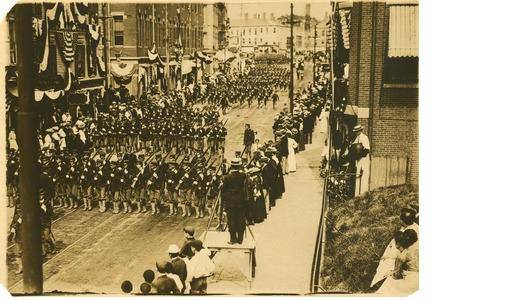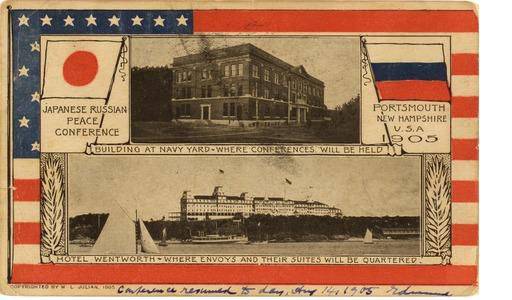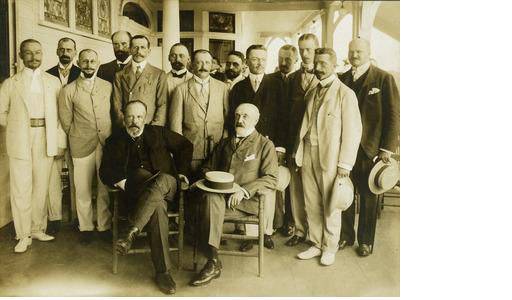The tale of Roosevelt the peacemaker, the greedy Japanese and the half-Sakhalin graph. To the 110 Anniversary of the Portsmouth World

Opinions are divided. The war minister, General Viktor Sakharov, said: “Under current conditions, ending the war is impossible. With our complete defeat, not having a single victory or even a successful business, it is a shame. This will drop the prestige of Russia and withdraw it from the great powers for a long time. We must continue the war not because of material benefits, but to wash away this stain, which will remain if we do not have the slightest success, as it has been up to now. ”
The bitter conclusion about the "successes" of Russia in the war with Japan - "not having a single victory or even a successful business" - is ignored by admirers of Nicholas II. But Sakharov was well informed, and he treated the revolutionaries so that six months later, the Socialist-Revolutionary Anastasia Bitsenko was shot dead.
The Minister of War was supported by State Comptroller Pavel Lobko, who noted that in the event of peace, “returning to Russia an army that was oppressed and not winning a single victory would worsen, rather than improve, the internal situation of the country”. And it was hard. Russia, having met 1905 by the fall of Port Arthur, then survived Bloody Sunday, the beginning of the revolution, the failure of Mukden (for more details, see the article “The Mukden battle through the eyes of eyewitnesses.” - ON) and the Tsushima defeat.
In turn, the Grand Duke Vladimir Alexandrovich spoke in favor of negotiations, adding that "if the conditions of peace are unacceptable for us according to conscience, then, of course, we will have to continue the war."
Divide and Conquer American Politics
Convening the meeting, Nicholas II reacted to the initiative of US President Theodore Roosevelt.
In March, 1904, when the war was just beginning, in a conversation with German Ambassador Roosevelt frankly said that the US is interested in Russia and Japan “possibly patting each other more strongly, and so that, after peace, such geographic areas will not disappear. there are tensions, so that with respect to the boundaries of their interests, they would oppose each other in much the same way as before the war. This will keep them in a state of military readiness and will moderate their appetites in other areas. In this case, Japan will not threaten Germany in Jiaozhou, and America in the Philippines. ”
By the end of the spring of 1905, the opposing sides were close to the state of which Roosevelt dreamed. Both Tokyo and St. Petersburg had big financial problems. Even after the tremendous success at Tsushima, the Japanese did not think about new victories, but about how to end the war at the peak of military success. The Japanese army suffered significant losses, especially in the officer corps. The issue of ammunition and finances was acute. Doctor historical Sci. Anatoly Koshkin cited the following data: “Japan spent about 2 billion yen on the war, and its public debt increased from 600 million yen to 2,4 billion yen. The Japanese government had to pay 110 million yen annually in interest alone. ”
Three days after Tsushima 18 (31) in May, Japanese Foreign Minister Yutaro Komura instructed the Japanese ambassador in Washington to find out whether Roosevelt would take the initiative to seat the Russians and the Japanese at the peace table. Roosevelt, who, according to Vitte's biographer Sergei Ilyin, after Tsushima "sent a congratulatory telegram to the winners, full of the most cordial, warm words and genuine admiration," on May 23 (June 5) instructed US Ambassador to Russia George Meyer to get an audience with Nikolay II and “Try to convince him that the continuation of the war is absolutely hopeless and could lead to the loss of all Russia's Far Eastern possessions.”
Two days later, Nicholas II agreed to Russia's participation in the negotiations.
While the Russian delegation was preparing to go, the daughter of US President Alice and the Minister of War (and future US President) William Howard Taft visited Tokyo. They were received by the emperor, Princess Nasimoto and Prime Minister Katsura Taro. The negotiations ended with the signing of a secret agreement, in which, in exchange for Japan’s refusal to claim the Philippines, the United States recognized Japanese sovereignty over Korea. "Having such an" allied "relationship behind us, T. Roosevelt, who took on the role of an" honest broker, "could not be an impartial mediator," said Natalia Narochnitskaya, doctor of historical sciences.
By agreeing to the role of mediator in the Russian-Japanese negotiations, the Americans were guided by their own interests. “For the Western powers, it was beneficial to contribute to the conclusion between Petersburg and Tokyo of such a world in which the parties would continue to consider each other as“ natural enemies, ”emphasizes Anatoly Koshkin. “At the same time, it was important to take all measures to completely exclude the possibility of concluding a Russian-Japanese union on an anti-Western basis.”
Komura v. Witte
The American Portsmouth was the site of the unsuccessful war for the Russian Empire. Emperor Nicholas II, in a statement by the head of the Russian delegation, Sergei Witte, emphasized that he wanted peace, but not at the cost of territorial concessions and without paying the contribution to the Japanese.

The Russian delegation that sailed from Cherbourg to America on 14 (27) in July included economic experts I.P. Shipov and D.D. Pokotilov, a specialist in international law, F.F. Martens, secretaries G.A. Plansson and I.Ya. Korostovets. The military department was represented by Major General N.S. Yermolaev and Colonel V.K. Samoilov. When the 20 of July (2 of August), the afternoon ship "Kaiser Wilhelm the Great" arrived in New York, the delegation was joined by the Russian ambassador to the United States, Baron R.R. Rosen and the captain of the 1 rank A.I. Rusin.
Arriving in the US, Witte noted the statement to the "great American press" and the American people, calling President Roosevelt a "brilliant leader."
The Japanese delegation was led by Baron Yutaro Komura. His right hand in the negotiations was the Japanese envoy to the US, Kogoro Takahira. Meeting the envoys of Tokyo and St. Petersburg, Roosevelt, who lived in the role of a peacemaker, tried to show that he was equally concerned with the Russian and Japanese delegations. The staff of the presidential yacht, consisting of American Japanese, was replaced by the Chinese for this occasion. On July 22 (August 4), the president received Witte, with whom the 2,5 talked for hours. During the conversation, Roosevelt strongly advised to make peace without stopping to pay the indemnity.
The peace conference in Portsmouth began on July 27 (August 9) from a preparatory meeting. The parties agreed that the official language of the conference will be French, two meetings will be held every day - from 9.30 to 12.00 and from 15.00 to 17.30. The regulations, however, were not always respected. As a result, there were twelve official meetings. Several personal meetings of Komura and Witte took place.
On August 10, after the exchange of powers and brief introductory statements, the head of the Japanese delegation, Komura, presented Witte with a note on the requirements points. Tokyo insisted on annexing Sakhalin with the adjacent islands, reimbursing Japan’s military expenditures, restricting Russian naval forces in the Far East and giving Japan as a prize to all Russian military ships interned in neutral ports. Japan demanded free hand in Korea, the complete evacuation of Russian troops from Manchuria, the transfer of lease rights to Japan on the Liaodong Peninsula with Port Arthur and Dalny, and the assignment of the entire railway between Port Arthur and Harbin with coal mines. Tokyo agreed to keep the Chinese Eastern Railway behind Russia, but with a limited right to use the road only for economic purposes. There was also a demand for the provision of unrestricted fishing rights to Japanese nationals along the Russian coast of the Sea of Japan, the Sea of Okhotsk, and the Bering Sea, including rivers, bays and bays.
Defend the sovereignty of Korea Witte could not. Komura got what he wanted - freedom of action for his country in Korea. Discussions on other topics came with varying success. The most difficult were questions about the contribution and ownership of Sakhalin. If Nicholas II was not ready for his loss and did not want to pay, then Witte, in the opinion of historian Anatoly Ignatiev, was more flexible and figured out “possible options (only territory, only money). Komura replied that his country wanted to receive both territory and money ... ”And the Japanese did not want a lot of money, but a lot - 1,2 billion yen (at that time, the yen was approximately equal to the Russian gold ruble).
The negotiations dragged on, which was nervously perceived by the elite of the Land of the Rising Sun. Japanese researcher Syumpay Okamoto writes that “the commander-in-chief of the Manchurian army, Komad, irritated by the slow holding of negotiations, urgently telegraphed his government so that it would soon make peace. Naval Minister Yamatoto was desperately pushing for concessions in the name of making peace ...
28 August 2 an afternoon joint meeting was held by Genro (advisory body under the emperor. - ON), the cabinet and senior military officials with the presence of the emperor ... Finance Minister Sone reported that it was impossible to continue the war because Japan could not find additional sources for its funding. "
The outcome of the meeting was an indication of Komura “to reach an early agreement in the negotiations, even if it is necessary to abandon the demands of monetary compensation and territories”.
At the moment when the Japanese government decided to retreat from its initial demands on Sakhalin, the US president again intervened. Natalia Narochnitskaya writes: “As far as the United States would like to“ reduce the possessions of Russia, ”it is clear from the telegram of T. Roosevelt, which he sent to Nicholas II. The American peacemaker in this telegram expressed confidence in the irresistible claims of Japan and threatened that the continuation of the war could lead to the loss of all Russian territory east of Lake Baikal, that is, to stop the existence of Russia as a Pacific state. These days in St. Petersburg, the American ambassador to Russia, Meyer, asking for an audience with the sovereign, began to persuade Nicholas II to make concessions, promising the mediation of President Theodore Roosevelt in "persuading" Japan to abandon the indemnity. Not tempted in treachery, Nicholas II as a whole “persisted”, not wanting any concessions, but then “in passing, as if to himself, remarked that one could consider the possibility of transferring the southern part of Sakhalin to Japan”. Information on readiness to agree to the transfer of South Sakhalin was immediately transferred to T. Roosevelt and in less than a day became known to the Japanese side. ”
August 23 (September 5) peace treaty was signed. Russia agreed to transfer to Japan the lease of the Liaodun Peninsula, the southern half of Sakhalin, the branch line from Port Arthur to Changchun Station, and generously compensate for the maintenance of Russian prisoners of war. Japanese fishermen got the right to fish along the Russian shores. Tokyo guaranteed freedom of navigation in the Laperuz Strait.
Before his departure, Ignatiev writes, Witte made a farewell visit to Roosevelt and “announced the king’s decision as a token of appreciation for his good services to stop charging the increased duties on the products of the American engineering and iron industry. The president was pleased. He tried to dispel the impression of the unilateral nature of his influence on the course of the negotiations and showed Witte the texts of appeals in which he advised the Japanese to be flexible. ”

The deed was done ...
"Komura would be better to take Russian citizenship ..."
At the talks in Portsmouth, neither side got all it wanted. Recognizing this, we must not forget that Japan has achieved a favorable solution for itself, of which the war began. Russia recognized her free hand in Korea and pledged to withdraw its troops from Manchuria. In addition, the Japanese received a good bonus - half of Sakhalin and the right to fish in the coastal waters of Primorye.
However, the greedy Japanese were waiting for more. If today the citizens of the Land of the Rising Sun are raving the Kuril Islands, the right to which Japan has lost forever, just in the 1905 year they firmly believed that they would receive new territories and a lot of money as a result of the war ...
The Japanese were shocked by the news that North Sakhalin will remain with Russia, and it will not pay the indemnity. This caused a burst of indignation of the islanders. 1 of September, the newspaper “Yorodo Shokho”, in an article entitled “Let's Take Them With Mourning Flags,” said: “It was our representatives who were poorly acting in the international arena and were disgraced. On the day of their return, they should be met with mourning banners. Every resident of the city must close the door of his house before them and turn away from them. And whoever will accept these nonentities, who have plunged our country into unprecedented humiliation, will be a vile creature, without a heart, without respect for his people, without a sense of justice. ”
In the editorial offices of the newspapers, angry letters were coming in. The author of one of them said that "Komur would be better to take Russian citizenship than to return home." Newspapers published news of the upcoming signing of peace in the mourning framework.
In order to thwart the signing of the 3 agreement in September, a large demonstration was held in Osaka. A telegram was sent to Komura: “The peace agreement that you are now going to sign cannot be accepted by the country. You are asked to cancel the agreement immediately. ”
After the peace treaty was still signed, an angry mob of greedy Japanese burned down the residence of the Minister of the Interior.
Komura was persecuted and removed from his post as Minister of Foreign Affairs.
Criticized and ridiculed and Witte. Koshkin writes: “In an effort to divert Nicholas II from responsibility for the surrender of Russian territory to South-South Sakhalin, the tsarist government and the court presented this concession as a manifestation of Witte’s diplomatic talent, who allegedly achieved quite a lot in defending Russia’s interests in negotiations. To this end, he was elevated to the county dignity with fanfare and glorified in every way. ” However, this did not save Witte from the nickname of Count Polusakhalinsky.
As for Theodore Roosevelt, he was awarded the Nobel Peace Prize.
Information